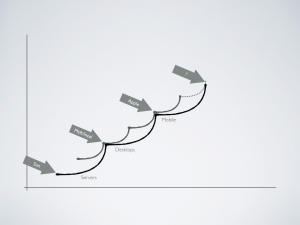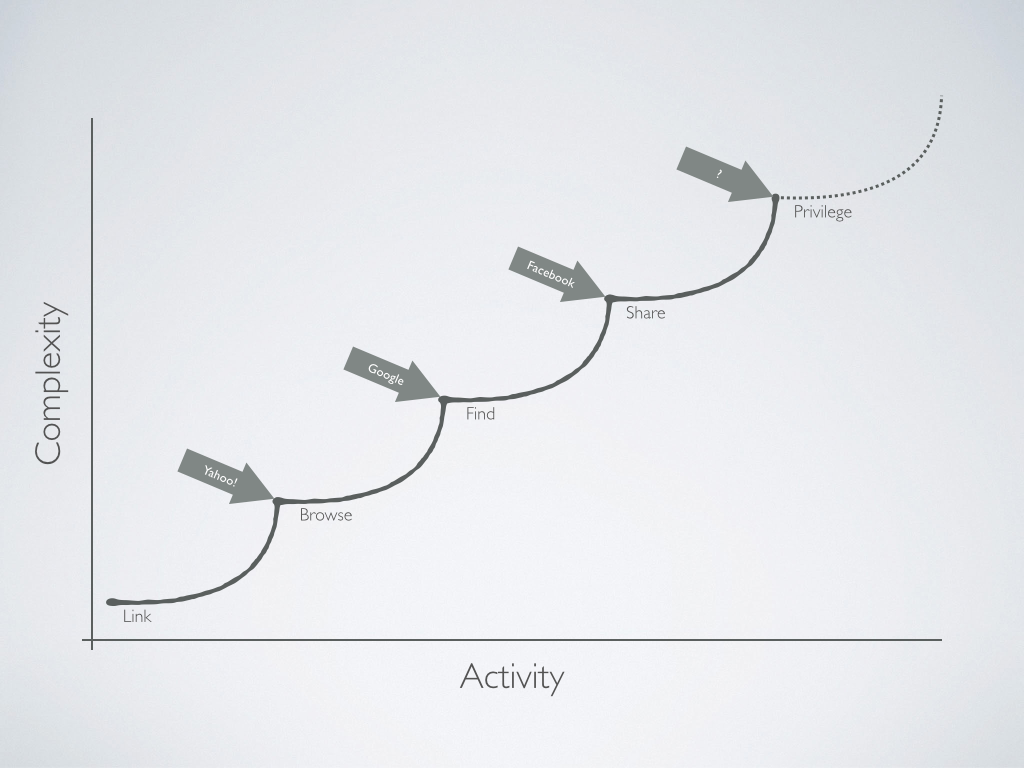There is an increasingly obvious pattern explaining how the Internet works at scale, and it seems like it could shed light on how future Internet activity will unfold.
A new media model on the Internet enables exciting new ways for people to share information and to communicate. As the volume of activity increases the experience becomes more complex. The complexity growth curve eventually forces a change - it starts increasing at a faster rate than the growth of the activity itself.A breaking point occurs. Participating becomes something people have to do in order to be part of the network, not something they want to do.
As a result, a new type of activity appears in response, something that solves the complexity problem and enables exciting new ways of connecting.
The cycle begins again.
 The cycle appears to happen via two distinct but parallel waves – information sharing and new ways of communicating evolve across a 5-year wave, while new hardware, operating systems and dominant network protocols evolve on a slower 10-year wave.
The cycle appears to happen via two distinct but parallel waves – information sharing and new ways of communicating evolve across a 5-year wave, while new hardware, operating systems and dominant network protocols evolve on a slower 10-year wave.
Ultimately, there are three run away champions. One that dominates the space via advertising, one that dominates through transactions, and one that owns the key hardware and operating system that people use to participate. They all achieve this position by establishing business models that benefit from the current pattern, optimized to leverage the characteristics of the new activity.
Five years ago when I was looking at this stuff the pattern indicated that by this year, 2015, social activity was going to become overwhelming and a breakthrough would appear in response to it.
Hello private messaging!
WhatsApp, Snapchat etc are a direct response to the overwhelming amount of activity happening on the big social platforms. Private messaging solves today’s complexity problem.
If the pattern is going to answer questions about the future then it needs to answer some other things like, “Who benefits from a world where people value privilege over sharing? How do you make money if people value exclusivity? What kinds of financial resources are going to accelerate growth in a market shaped like this?”
Private ad exchanges, members-only programs, privileged access services, private transactions and cybercurrencies will all flourish in this environment. Inequality will become a commercial virtue.
However, a large-scale network that values privilege is going to create serious long term problems if we fail to at least acknowledge the implications of it.
Inequality breeds resentment and power struggles. The Internet’s amazing democratic capabilities will become even more politicized. Divergent agendas will wage legal, economic and cultural battles with increasing sophistication and with more at stake.
But perhaps we can keep an eye on what to expect further down the line in order to maintain perspective on these short term shifts.
What comes after the current wave? What happens in 2020?
If the pattern continues then the volume of this new activity will become overwhelming which will trigger a response. We’ll hit a ceiling when the amount of exclusive activity becomes unmanageable.
A great outcome would be a reinvestment in the open Internet, but, if history serves us, then the incumbents will be deeply established and too strong to overcome. A total rejection of the network is more likely than a return to its roots.
A less dramatic outcome would be about alternative protocols on alternative networks. Technologies enabling Internet-of-Things are obvious candidates for the new hardware wave. If that’s happening then it’s easy to imagine physical gestures becoming the dominant way we experience the network.
Who benefits? How will people make money? These are big question for another time.
Can we zoom out on this model? Is there a meta pattern in the pattern?
Maybe there’s a 20-year wave where complexity across all network activity increases to unbearable levels. If that is actually what happens then it’s reasonable to expect a transportation revolution.
When remote communication becomes overwhelmingly complex then we will want better ways to get places and to be with people. This might be forced on us all by external events such as climate change, so it seems likely to happen at some point, anyhow.
Maybe this pattern offers some clarity on what circumstances will get us there and when.
You can’t take any of this too seriously, obviously.
The pattern lacks rigor. There’s no data behind it. It doesn’t take into account external events that shape rates of change. And the time frame we’re looking at is too small to draw meaningful conclusions.
It’s merely a working hypothesis.
However, if Bill Gross is right about the importance of timing then maybe this pattern is worth applying to whatever you are working on.
If privilege is what matters then you need to have a position on it.
Are you building trust as a core activity of your work? Do you make your customers feel privileged? Does activity increase in value to your customers the more exclusive it becomes?
You don’t have to do those things as a pureplay like messaging apps or dating services or private trading networks to be relevant. But you can be sure that those issues will matter more and more over the next 3 to 5 years.
Equally, who is keeping privilege in check? Who becomes more powerful in a privileged world, and who is ensuring they are using that power fairly?
Who is going to worry about all this on behalf of the rest of us who get caught up in it?
The nuances of privacy in this new world are going to make it harder than ever to keep power in check and to challenge authority.
We’re going to need clever journalism now more than ever before.
What does it take to get on the wave?
If you’re reading blog posts like this about current trends then you’ve probably missed the leading edge of the current wave already. Rather than ride this one you may get thrown by it, and going against it may get really difficult. You might be forced to shift your agenda in ways that contradict your latest 5-year plan.
It’s certainly not too late to try to get on it.
Being open to partnering with people who are closer to the leading edge than you are can be a good way to navigate unfavorable conditions even if they challenge the very core of why you exist. An external mirror is very useful when facing existential crises.
Also, I don’t know if “the enemy of my enemy is my friend” works in a world built on coopetition. But it’s a good idea to know who Facebook worries about.
The good news is that you can be sure that there will be another chance to get your timing right.
When there’s too much privileged, private and exclusive activity the network will become too complex again. And everything will change because of it. That’s one thing we can all count on.
Get up early, paddle out to the waves you want to catch, and try a few to warm up. Stand up when the right one comes along and ride it for all it’s worth.
